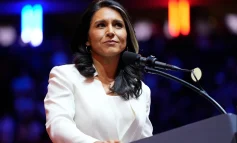
|
| Photo: Reuters |
“It’s 3 a.m., and your children are safe and asleep. But there’s a phone in the White House, and it’s ringing. Something is happening in the world.”
These words were uttered by the narrator in a 2008 Hillary Clinton ad, back when the-then senator was vying for the Democratic nomination against, Barack Obama.
With the rise of ISIS, the world seems like a more dangerous place today. National security has taken the center stage in the platforms of the presidential candidates. Candidates on both sides are promoting their strategies for defeating ISIS.
Below are the major candidates’ plans against the extremist militants in Syria and Iraq:
Hillary Clinton
The former secretary of state’s plan to defeat ISIS seems like a continuation of that of President Obama. Clinton wants to broaden the coalition involved in the aerial campaign against the terrorist groups by “pulling countries off the sidelines.”
“We can’t just contain ISIS—we need to defeat it,” reads a statement on her campaign website. “That means going after the group in Syria, Iraq and across the Middle East. And it means ramping up air strikes and making sure local and regional ground troops have what they need to go after ISIS and create safe spaces.”
The Democratic frontrunner also wants to work with Middle Eastern partners to target the militants’ propaganda tools.
As Obama’s secretary of state, Clinton called on Syrian President Bashar Assad to step down back in August of 2011.
But as the conflict in Syria grew into a destructive civil war that resulted in the rise of extremism and claimed hundreds of thousands of lives, Clinton’s main concern in Syria became ISIS, not Assad.
“There is not going to be a successful military effort at this point to overturn Assad,” she said at the Council on Foreign Relations in November. “That can only happen to the political process, so our efforts should be focused on ISIS.”
Clinton faults Obama for not arming the rebels against Assad in the conflict before Iran, Russia and Hezbollah came to the aid of the Syrian government.
“We need to get people to turn against the common enemy of ISIS, and then we need to figure out how we put together a political outcome,” she said.
Bernie Sanders
Bernie Sanders is not an interventionist. He has often calls out Clinton for being a “fan of regime change.” The self-proclaimed democratic socialist wants to minimize U.S. interference in the affairs of foreign countries.
The Vermont senator blames the rise of ISIS on the U.S. invasion of Iraq. He often criticizes Clinton for voting in favor of the war in 2013 when she was a senator, while he opposed it as a U.S. representative.
He argues that the Iraq vote demonstrates his superior judgment on foreign policy issues, despite Clinton’s experience.
Sanders has emphasized on moving away from unilateral military action. To defeat ISIS, Sanders says the U.S. army should be a part of a coalition led by Muslim allies in the Middle East.
“While we must be relentless in combating terrorists who would do us harm, we cannot and should not be policeman of the world, nor bear the burden of fighting terrorism alone,” reads a statement on the senator’s website. “The United States should be part of an international coalition, led and sustained by nations in the region that have the means to protect themselves. That is the only way to defeat ISIS and to begin the process of creating the conditions for a lasting peace in the region.”
Sanders has called on Saudi Arabia, Iran, Turkey and Jordan to get their “hands dirty” and “their boots on the ground” to defeat the extremists in Syria and Iraq. The senator also singles out Qatar while urging Arab nations to focus on fighting fundamentalists.
“It has been reported that Qatar will spend $200 billion on the 2022 World Cup, including the construction of an enormous number of facilities to host that event—$200 billion on hosting a soccer event, yet very little to fight against ISIS,” he said last year.
Sanders also wants to root out terrorist funding networks.
However, it is not clear how Sanders would get Middle Eastern powers — some of which are enemies — to cooperate against terrorism. While Sanders does not want America to be trapped in a perpetual conflict in Syria, it would prove a momentous task to convince Arab nations to take part in a war the U.S. wants to avoid.
Sanders advocates for an internationally negotiated political agreement to end the conflict in Syria.
He opposes imposing a no-fly zone in Syria and does not see ousting Syrian President Bashar Assad as a foreign policy priority — a view shared by GOP frontrunner Donald Trump.
Donald Trump
Trump seems indifferent about Assad. Last October he slammed Obama for supporting the Syrian rebels.
“Assad is bad,” the real estate mogul said. “Maybe these people could be worse.”
Trump also partly faults George W. Bush and the Iraq War for the chaos in the Middle East. But he goes a step further, saying the Obama administration contributed to the rise of ISIS.
“They’ve created ISIS. Hillary Clinton created ISIS with Obama,” Trump said at a rally in January.
The Republican frontrunner, whose campaign is built around the promise to “make America great again”, argues that Washington is losing the war against terrorism.
In his “we don’t win anymore” monologue that he often repeats at rallies and debates, he always claims that the United States has been unable to defeat ISIS.
His plan to defeat the terrorists focuses on drying out their financial resources and taking “their oil.”
“To the victor belongs the spoils. You take the oil—you don’t just leave it,” he once said.
Trump has not explained how would go about taking the oil.
The reality TV celebrity wants to intensify the bombing campaign against militants in Syria and Iraq. Asked by Fox News last year if he would consider deploying ground troops against ISIS, he said, “I would do whatever you have to do.”
In a radio ad, Trump promises to “quickly and decisively bomb the hell out of ISIS.”
Trump’s bombastic approach against terrorism pays little regard to international and domestic laws. He once called his Republican opponent Ted Cruz a pu**y for being hesitant when asked if he would authorize water-boarding against terrorism suspects.
Trump also plans to deter terrorists by killing their relatives.
“When you get these terrorists,” Trump told Bill O’Reilly in January, “you have to take out their families.”
Ted Cruz
Cruz describes Assad as a “bad man”’ but says the United State is safer with him in power.
“If you topple a stable ruler, throw a Middle Eastern country into chaos and hand it over to radical Islamic terrorists, that hurts America,” Cruz said last December.
The Texas senator’s plan for ISIS mirrors Trump’s, with more emphasis on the bombing. His pledge to carpet bomb areas that ISIS controls has raised concerns about civilian casualties, but the senator has reiterated his stance, refusing to back down.
“We will carpet-bomb them into oblivion,” he said in December. “I don’t know if sand can glow in the dark, but we’re going to find out.”
Cruz is against deploying American troops to fight the militants and would rather arm Kurdish militants to be “our boots on the ground.”
Marco Rubio
Marco Rubio, who represents the traditional neoconservative wing of the Republican party, says toppling Assad is instrumental to defeating ISIS. The Florida senator advocates for strikes against the Syrian government.
“As long as Assad is in power, you’re going to have in place someone that creates the conditions for the next ISIS to pop up, for the next ISIS to emerge,” he said in December.
Rubio wants Sunni Arab allies to form a coalition to fight ISIS on the ground. He says the anti-ISIS forces would be backed by embedded American operators, without specifying the number or scope of involvement of U.S. troops.
John Kasich
The Ohio governor wants the United States to put boots on the ground to destroy ISIS, but he would not use U.S. troops to depose Assad. He told MSNBC last month that the United States should not be “embroiled” in civil wars in the Middle East.
Kasich opposes the Bush Doctrine.
“I am not a person that believes in nation building,” he said in November. “Nation building is not something for us to risk our men and women in uniform to do. Take care of business and come home.”






Leave a Reply